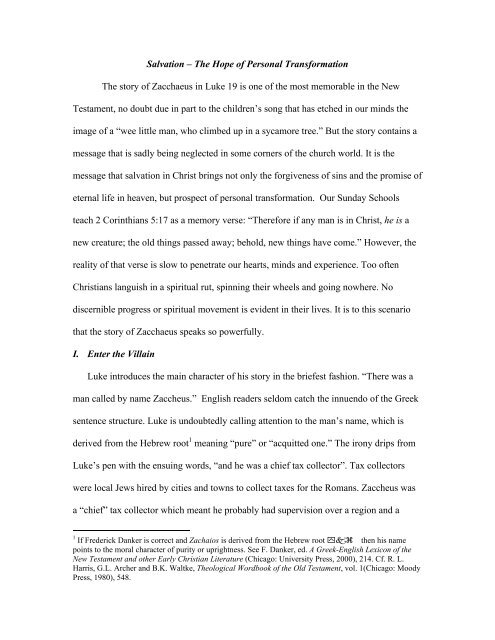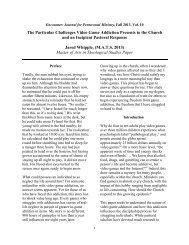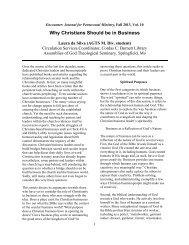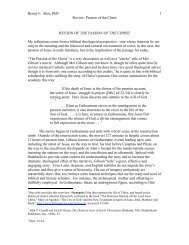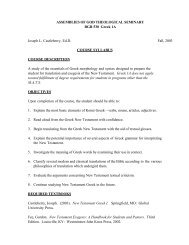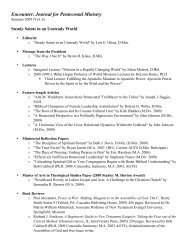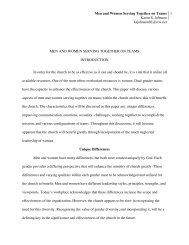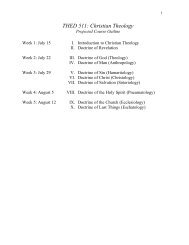Salvation – The Hope of Personal Transformation The story of ...
Salvation – The Hope of Personal Transformation The story of ...
Salvation – The Hope of Personal Transformation The story of ...
Create successful ePaper yourself
Turn your PDF publications into a flip-book with our unique Google optimized e-Paper software.
<strong>Salvation</strong> <strong>–</strong> <strong>The</strong> <strong>Hope</strong> <strong>of</strong> <strong>Personal</strong> <strong>Transformation</strong><br />
<strong>The</strong> <strong>story</strong> <strong>of</strong> Zacchaeus in Luke 19 is one <strong>of</strong> the most memorable in the New<br />
Testament, no doubt due in part to the children’s song that has etched in our minds the<br />
image <strong>of</strong> a “wee little man, who climbed up in a sycamore tree.” But the <strong>story</strong> contains a<br />
message that is sadly being neglected in some corners <strong>of</strong> the church world. It is the<br />
message that salvation in Christ brings not only the forgiveness <strong>of</strong> sins and the promise <strong>of</strong><br />
eternal life in heaven, but prospect <strong>of</strong> personal transformation. Our Sunday Schools<br />
teach 2 Corinthians 5:17 as a memory verse: “<strong>The</strong>refore if any man is in Christ, he is a<br />
new creature; the old things passed away; behold, new things have come.” However, the<br />
reality <strong>of</strong> that verse is slow to penetrate our hearts, minds and experience. Too <strong>of</strong>ten<br />
Christians languish in a spiritual rut, spinning their wheels and going nowhere. No<br />
discernible progress or spiritual movement is evident in their lives. It is to this scenario<br />
that the <strong>story</strong> <strong>of</strong> Zacchaeus speaks so powerfully.<br />
I. Enter the Villain<br />
Luke introduces the main character <strong>of</strong> his <strong>story</strong> in the briefest fashion. “<strong>The</strong>re was a<br />
man called by name Zaccheus.” English readers seldom catch the innuendo <strong>of</strong> the Greek<br />
sentence structure. Luke is undoubtedly calling attention to the man’s name, which is<br />
derived from the Hebrew root 1 meaning “pure” or “acquitted one.” <strong>The</strong> irony drips from<br />
Luke’s pen with the ensuing words, “and he was a chief tax collector”. Tax collectors<br />
were local Jews hired by cities and towns to collect taxes for the Romans. Zaccheus was<br />
a “chief” tax collector which meant he probably had supervision over a region and a<br />
1 If Frederick Danker is correct and Zachaios is derived from the Hebrew root ��� then his name<br />
points to the moral character <strong>of</strong> purity or uprightness. See F. Danker, ed. A Greek-English Lexicon <strong>of</strong> the<br />
New Testament and other Early Christian Literature (Chicago: University Press, 2000), 214. Cf. R. L.<br />
Harris, G.L. Archer and B.K. Waltke, <strong>The</strong>ological Wordbook <strong>of</strong> the Old Testament, vol. 1(Chicago: Moody<br />
Press, 1980), 548.
number <strong>of</strong> tax collectors. Luke’s words “and he was rich” would certainly not go<br />
unnoticed by Jews in Jesus’ day. <strong>The</strong> privilege <strong>of</strong> collecting taxes was <strong>of</strong>fered at a steep<br />
price and those who held that job set tax rates that <strong>of</strong>ten exceeded by far any quotas<br />
demanded by Rome. While having no authority to confiscate funds or property, they<br />
could exact severe penalties by reporting tax delinquency to the Romans. This they <strong>of</strong>ten<br />
did whether the charges were true or not. 2 Keep in mind also that “tax-collectors” were<br />
notorious for their corruption and the mere mention <strong>of</strong> their name aligned them with<br />
“sinners.” (See Mt 9:11; Mk 2:15f; Lk 5:30). And so here Luke presents an arch villain<br />
who is ironically named. He was anything but pure or blameless in character; he was, in<br />
fact, the exact opposite.<br />
II. <strong>The</strong> Action <strong>of</strong> Zaccheus<br />
But this notorious sinner is soon found to be in a seeking mode. How and when he<br />
heard about Jesus we do not know. What kind <strong>of</strong> report sparked his desire to see Jesus is<br />
also unknown. However, what we read paints an ironic and even comical picture.<br />
Zaccheus was obviously well-known in the area (v.7) at least by reputation. His position<br />
and wealth would have placed him at the highest echelon <strong>of</strong> societal status. But this “big”<br />
man in society was woefully lacking in physical stature. He who <strong>of</strong>ten looked down at<br />
people from his pinnacle <strong>of</strong> societal power could not see Jesus over the crowd. Although<br />
left unstated, I cannot help but conclude that only an unseen and desperate spiritual need<br />
could have forced a man <strong>of</strong> his status to take up the humiliating posture <strong>of</strong> an adolescent<br />
“tree-climber.”<br />
2 Everett Ferguson points out that the word translated “defrauded” in 19:8 (Gk. sukophanteo) actually<br />
means to “bring false charges.” See E. Ferguson, Backgrounds <strong>of</strong> Early Christianity (Grand Rapids: Wm.<br />
B. Eerdmans Co., 2 nd ed., 1993), 88.
II. <strong>The</strong> Action <strong>of</strong> Zaccheus<br />
But this notorious sinner is soon found to be in a seeking mode. How and when he<br />
heard about Jesus we do not know. What kind <strong>of</strong> report sparked his desire to see Jesus is<br />
also unknown. However, what we read paints an ironic and even comical picture.<br />
Zaccheus was obviously well-known in the area (v.7) at least by reputation. His position<br />
and wealth would have placed him among the societal elite. But this “big” man in society<br />
was woefully lacking in physical stature. He who <strong>of</strong>ten looked down at people from his<br />
pinnacle <strong>of</strong> power could not see Jesus over the crowd. We are left to ask and ponder what<br />
unseen and desperate spiritual need could have forced a man <strong>of</strong> his status to take up the<br />
humiliating posture <strong>of</strong> an adolescent “tree-climber.”<br />
III. <strong>The</strong> Call and Invitation <strong>of</strong> Jesus<br />
<strong>The</strong> irony continues when Jesus stops under this sycamore tree and calls him to come<br />
down. With all eyes drawn to this despised tax-collector, the potential for a prophetic<br />
rebuke was possible and perhaps even anticipated by the crowd. But Jesus does not berate<br />
him or add to his obvious humiliating posture. Instead he honors him by calling him by<br />
name and declaring his desire to be a guest at his house.<br />
IV. <strong>The</strong> Transforming Fellowship<br />
What Luke omits from the cries out for completion. Except for the peoples’<br />
complaint that Jesus was going as a guest to the home <strong>of</strong> a sinner, 3 Luke says nothing<br />
about what happened next. Instead we find Zacchaeus stopping 4 and saying to the Lord,<br />
3 This undoubtedly they regarded as a gross social and religious indiscretion.<br />
4 Whether this happened on the way to Zacchaeus’ house, or in the house some time during their visit is not<br />
certain, although the latter is more probable.
“Behold, Lord, half <strong>of</strong> my possessions I will give to the poor, and if I have defrauded 5<br />
anyone <strong>of</strong> anything, I will give them back four times as much.” Embedded in these words<br />
are all the marks <strong>of</strong> true repentance: a recognition <strong>of</strong> sin, a willingness to make<br />
restitution, and a commitment to embark on a path <strong>of</strong> righteousness. Somehow, perhaps<br />
while fellowshipping with Jesus in his home, the taker was transformed into a giver. <strong>The</strong><br />
greedy cheat who defrauded people was given a benevolent and just heart. Zacchaeus<br />
even adopts the spirit <strong>of</strong> the Law when he commits to making restitution for past sins<br />
(See Ex 22:1-4). Nothing can account for this dramatic change, except the grace <strong>of</strong> God<br />
that produces repentance.<br />
Concluding Thoughts and Application:<br />
Zacchaeus’ <strong>story</strong> while unique to Luke’s Gospel is not unique at all. It tells the <strong>story</strong><br />
<strong>of</strong> personal transformation made possible by a faith-encounter with Jesus Christ. It<br />
illustrates the transforming effects <strong>of</strong> that encounter. Through the preaching <strong>of</strong> the Gospel<br />
people are called to a transforming fellowship with God and his Son, Jesus Christ (1Jn<br />
1:3). At conversion sinners experience an inner transformation that reorients their entire<br />
lives. <strong>The</strong>y become subjects and citizens <strong>of</strong> a new Kingdom (see Col 1:13; Phil 3:20),<br />
who are in the world but no longer <strong>of</strong> the world. In a very real sense, all things become<br />
new (cf. 2Cor 5:17). Regeneration (“being born again”) and the indwelling presence <strong>of</strong><br />
the Holy Spirit initiates the process <strong>of</strong> becoming transformed into the image <strong>of</strong> Christ<br />
(Rm 8:28f; 2Cor 3:18; Tit 3:5).<br />
To the Jews <strong>of</strong> Jesus’ day, Zacchaeus was unlikely candidate for spiritual<br />
transformation, but perhaps that is Luke’s reason for including the <strong>story</strong>. May we be<br />
5 <strong>The</strong> Greek syntax indicates that what is described in the “if” clause <strong>of</strong> this conditional sentence is<br />
assumed to be “true.”
encouraged to see people not merely as they are, but with eyes <strong>of</strong> faith that images what<br />
they can be by the transforming grace <strong>of</strong> God.


